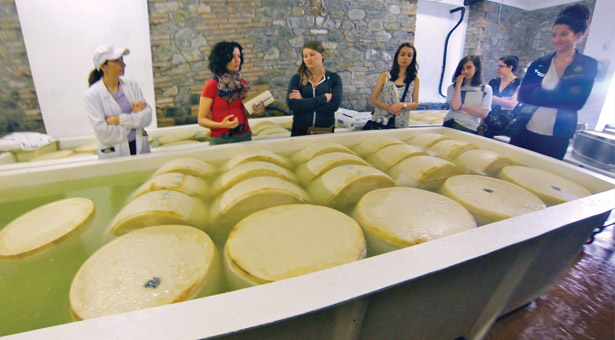The World Acting Globally
At the Tuscan Table
SPU Students Explore Italy’s Sustainable Food Production in New Study Abroad Program
By Colleen Steelquist (steelquistc@spu.edu) | Photos by Katt Holbrook

The bounty of Italy — including prosciutto di Parma, Sangiovese grapes, heirloom tomatoes, and zucchini blossoms — offered delectable proof of sustainable food production for students in SPU’s new global seminar in Florence. Associate Professor of Food and Nutrition Daniela Geleva (second from left) and her students tour a farm where Parmigiano-Reggiano cheese is being made. The nutty flavor is achieved through 20 days in a saltwater bath, followed by aging for about two years.
![]() View more photos
View more photos
When Margaret Johnson started working during high school, she began saving for a long-held dream: to study abroad in college. The new global seminar in Florence, Italy, focused on sustainable food production and the Mediterranean diet and lifestyle, caught her eye.
A food and nutritional sciences major with a dietetics emphasis, she thought, “This program is perfect timing!”
Johnson and 14 other Seattle Pacific University students from various majors spent most of September soaking up la dolce vita in Florence, the cradle of the Renaissance. Italy is also birthplace of the international slow food movement, which strives to preserve traditional and regional cuisine.
The one-month study abroad program was the culmination of more than three years of planning by Daniela Geleva, associate professor of food and nutrition. “I think for students to venture out to a new country and a new culture and to really get to know that culture through the lens of food is absolutely transforming,” she says of the program.
The group lived in furnished apartments throughout the city center while studying at Florence University of the Arts. Weekdays were filled with classes, cooking workshops, Italian language study, and unforgettable excursions into the countryside of Tuscany and Emilia-Romagna to see and taste the tantalizing Mediterranean foods that have sustained Italians for centuries: Parmigiano-Reggiano cheese, wine, honey, prosciutto, balsamic vinegar, and more.
On one of these field trips, the students visited a breeder of Chianina cows, an ancient Tuscan breed used for the famous bistecca alla fiorentina. Afterward, the breeder invited the group — 19 in all — into his home.
“He brought us to a table where his wife had made all of these treats for us from scratch,” Geleva recalls. “The students were in disbelief at the hospitality of complete strangers. We weren’t paying them anything. We couldn’t buy anything. It was completely done because they loved what they did and they wanted to welcome us. The students talked about that for days. They couldn’t really wrap their minds around that kind of hospitality.“
As a global development studies major, senior Chelsea Hattox had plenty to ponder after visiting the small-scale, high-quality food producers. “I know that food and water are huge barriers to development in other countries,” she says, observing that our food travels a lot of miles on its journey from farm to table. “I wanted to see how food production is done in a more sustainable way, and I totally did in Italy.”
Back in Seattle, Geleva is bringing the students’ understanding full circle with field trips to a local farm and a meat-and-cheese producer, getting them connected to food produced sustainably right here in the Northwest.
“Those are the businesses I want to support — people who are doing it right,” Johnson says. “Spending time in Italy made me want to eat higher quality food. We spend so much money on frivolous things, but we don’t put that money into food, our sustenance. I want to put more of my resources into buying better quality food that’s sustainably produced.”
